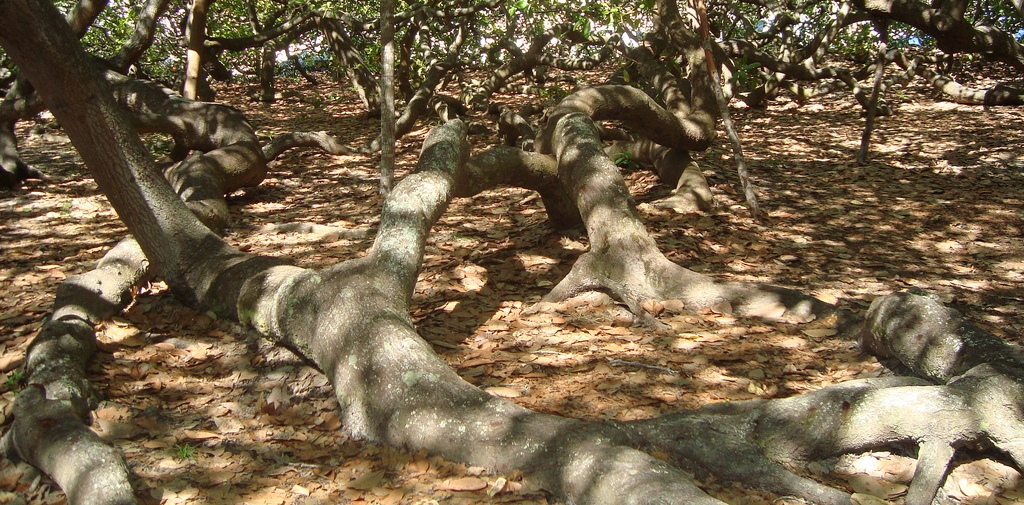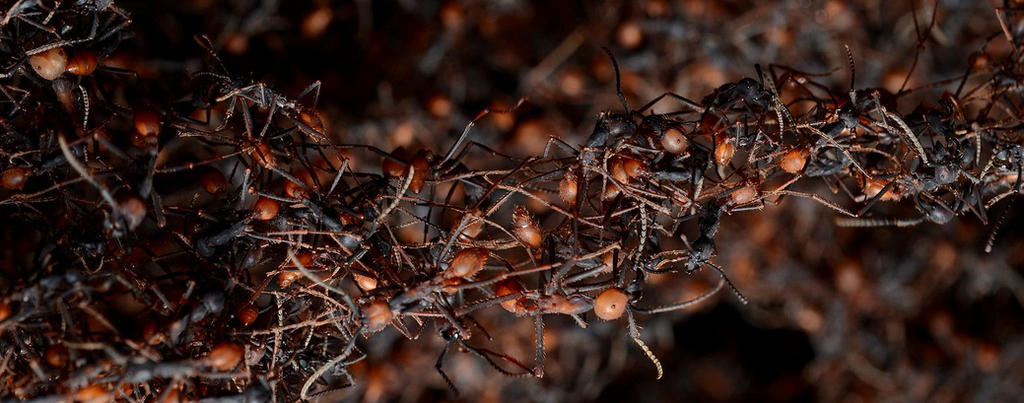Many imperial woods and forests are thick but somewhat peaceful,
places where a villager can hunt rabbits by need or pleasure. The
goddess accepts it. Ka'aari, the sanctuary reserve of Corallin, is
different. The soil surface is a maze of fallen logs, mounds of decayed
leaves, stinging tree-creepers so wide and entangled that some trees
never fall to the ground. Below all this, the soil is impenetrable due
to the way the space between two roots seems to be filled by a third
one. The flora's natural competition is amplified by Corallin's divine
power to a point where it becomes perceptible to people.
Look up, to your feet, behind you. Wherever your eyes gaze, you'll see olive-green and nut-brown speckled with all the colors of the world, except the sunlight hidden beyond the verdant canopy. But it's never dark. Lichens soak our eyes with orange and pink, bunches of mushrooms can be used as candlesticks which flash yellows and violets.
Look up, to your feet, behind you. Wherever your eyes gaze, you'll see olive-green and nut-brown speckled with all the colors of the world, except the sunlight hidden beyond the verdant canopy. But it's never dark. Lichens soak our eyes with orange and pink, bunches of mushrooms can be used as candlesticks which flash yellows and violets.
The scents are of honey, garlic, rotten fish, damp wood and dry pollen,
everything fresh and bitter, sweet and sickening all at once. When you
think you got used to it, a new smell appears to disagree. At Ka'aari,
even the smells are wild and aggressive.
And the
sounds, by Corallin Earth-Dame, the sounds. Even without rain or winds,
trees creak with their own weight e canopies rustle like gossipy
neighbors.
During this spectacle, be careful as not to
stumble on the nuts, huge but so wrinkled that they barely feed
someone. Rest at the leave's hills that relax like a cushion filled with
feathers, extend your hand to the sweet sap pouring out by the
trunk side, running so thick that it polishes the rocks beneath into
pebbles, use a fruit to massage your neck. Don't be hasty, it may take a
day to cross a mile in Ka'aari.
But for your own good, do not bring wrought iron here. Corallin disapproves of it. She created the rust after seeing how people abused her mineral gifts, and some local animals can make a sword useless. The Mother-Goddess gave us much, but won't fail to punish our faults. We don't mind, for we know where to find grasses so stiff and sharp that only the root can be handled.
But for your own good, do not bring wrought iron here. Corallin disapproves of it. She created the rust after seeing how people abused her mineral gifts, and some local animals can make a sword useless. The Mother-Goddess gave us much, but won't fail to punish our faults. We don't mind, for we know where to find grasses so stiff and sharp that only the root can be handled.
-Mera
Lyn’Dis (feidralin), Grán Cacique of the Conclave of the Eternal
Druids, the greatest autorithy of the Corallin's cult at Ka'aari. The
accusation that she lead the fleet which, recently, attacked the
diplomatic vessel due to Technogestalt is being investigated.
Besides the sanctuary's vegetable wonders, there are astounding
animals. The sanctuary's greatest defense are the nomad hives, each ant
twenty inches long plus eight-inch, double-scissored mandibles. They are
Corallin's answer to any stupid attempt to deforest or civilize the
wild nature she reserved to herself.
Intangible nevertheless vital, anhanguás are errant spirits that may posses an animal, take away its fear and fill the void with blood lust. Long-term possessions will change the animal, strengthen its natural weapons and skills. Dire versions of common animals and, possibly, carnivorous plants are what happens when creatures possessed by Anhanguás managed to reproduce. I don't believe these spirits mean to harm anyone, simply create a symbiosis with its host. After a aggressive period of adaptation, they become beasts as magnificent as unicorns and gryphons. Perhaps the goddess created them as a way to fortify nature against the extremes of civilization, including the northern empire.
And prolific as only the nature can be, Corallin has more celestial servants than all the other pantheon's gods combined. The majority are the gigelorum, supernatural animals with a physical body, but so tiny they are invisible. Spread throughout the lands and waters in the empire, they affect every harvest, spring and herd. They also exist beyond the empire, except for the Restless Lands, where the nefilim ate them. Ka'aari is saturated with gigelorum. Even decomposition is faster, I have seen megatherium corpses gone after a few hours. The local tribes use caves for their temples because dead wood rottens very fast. I still remember when a ship's crew landed at the beach to capture animals, only to find an useless hulk on their return. That was more than a century ago, and their descendents now are the Pictupi tribe. They paint themselves in blue because haven't learned which resins prevent clothing from dissolving. I believe the spirits we call anhanguás are, actually, gigelorum colonies acting in concert.-Itagi Abagna (shardokan), keeper of the prophetic beehive.
Intangible nevertheless vital, anhanguás are errant spirits that may posses an animal, take away its fear and fill the void with blood lust. Long-term possessions will change the animal, strengthen its natural weapons and skills. Dire versions of common animals and, possibly, carnivorous plants are what happens when creatures possessed by Anhanguás managed to reproduce. I don't believe these spirits mean to harm anyone, simply create a symbiosis with its host. After a aggressive period of adaptation, they become beasts as magnificent as unicorns and gryphons. Perhaps the goddess created them as a way to fortify nature against the extremes of civilization, including the northern empire.
And prolific as only the nature can be, Corallin has more celestial servants than all the other pantheon's gods combined. The majority are the gigelorum, supernatural animals with a physical body, but so tiny they are invisible. Spread throughout the lands and waters in the empire, they affect every harvest, spring and herd. They also exist beyond the empire, except for the Restless Lands, where the nefilim ate them. Ka'aari is saturated with gigelorum. Even decomposition is faster, I have seen megatherium corpses gone after a few hours. The local tribes use caves for their temples because dead wood rottens very fast. I still remember when a ship's crew landed at the beach to capture animals, only to find an useless hulk on their return. That was more than a century ago, and their descendents now are the Pictupi tribe. They paint themselves in blue because haven't learned which resins prevent clothing from dissolving. I believe the spirits we call anhanguás are, actually, gigelorum colonies acting in concert.-Itagi Abagna (shardokan), keeper of the prophetic beehive.



Nenhum comentário:
Postar um comentário